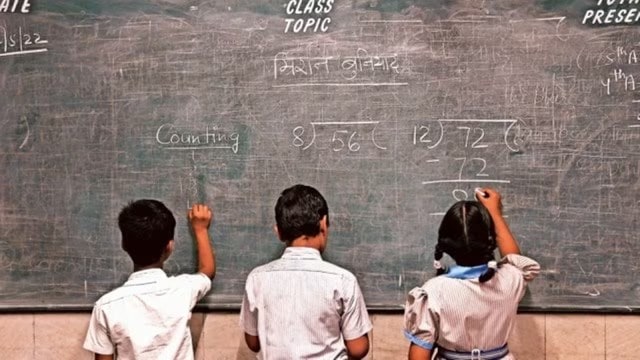Click here to join Express Pune WhatsApp channel and get a curated list of our stories
Pvt schools welcome amended RTE rules, activists say will increase divide between ‘rich’ and ‘poor’ students
So far in Maharashtra, students could apply to private unaided or self-financed schools within a radius of one to 3km under the Right to Education Act, 2009.
 There are 1,04,782 schools registered with the primary education in the state but only 8,832 (as of 2023) were taking RTE admissions, said a press release issued by Commissioner of Education Suraj Mandhare on Thursday. (Representational Photo)
There are 1,04,782 schools registered with the primary education in the state but only 8,832 (as of 2023) were taking RTE admissions, said a press release issued by Commissioner of Education Suraj Mandhare on Thursday. (Representational Photo)While communications from the government portray new changes to RTE rules in Maharashtra as expanding the scope of RTE to government-run and aided schools, many in the city are seeing this as a major step backwards.
So far in Maharashtra, students could apply to private unaided or self-financed schools within a radius of one to 3km under the Right to Education Act, 2009. A gazette notification issued by the state government dated February 9 states that if there is a government-run or government-aided school within a 1km radius of a private school, then that private school will be exempted from the 25% RTE quota.
There are 1,04,782 schools registered with the primary education in the state but only 8,832 (as of 2023) were taking RTE admissions, said a press release issued by Commissioner of Education Suraj Mandhare on Thursday.
“This change has been made to ensure that all eligible children get admission to their nearest schools. In fact, these new rules expand the scope of the Right to Education by increasing the number of schools to now also include government schools, private-aided and partially aided schools,” said Mandhare.
Meanwhile, critics are saying this could further a social divide and act as a disadvantage for economically-disadvantaged students enrolled under RTE. Matin Mujawar, an educationist and RTE activist based in Pune said, “The small window through which some disadvantaged students got to access good education in private schools is now being effectively closed. One of the intentions of this law was to enable students from marginalised backgrounds to get education in good schools.”
“The state of government schools has deteriorated consistently and the spending on these schools has never been enough. Most of these government schools have already collapsed and are on the verge of shutting down. They barely have any students. With the option of private schools gone, the incentive for parents to apply and follow through with RTE admissions will also probably dwindle and dropout rates could increase,” said Mujawar.
Private school owners and associations however have welcomed this decision. Notably, they had been protesting and threatening to boycott the 2024 admissions due to non-payment of RTE fees by the government. The state government has over Rs 2,000 crore pending in RTE fees due to private schools.
Rajendra Chorge, vice president of Independent English Schools’ Association, said, “This is a good decision and we welcome it. The number of RTE admissions in private schools will considerably reduce as there are many private schools with government or aided schools nearby. Additionally, the number of students in government schools will also increase.”
The Aam Aadmi Party Parents Union has pointed out that the mapping of private schools and aided or government schools will take a long time and the delay in implementation could affect lakhs of children in the state. The amended rules shall be implemented starting from this academic year (2024-25).
Mukund Kirdat, spokesperson of the Aam Aadmi Party Parents Union, said, “In cities like Pune, almost all private schools will end up getting exempted from the obligation of RTE admissions. This decision of the government will create a division between ‘rich schools for rich children’ and ‘poor schools for poor children’.”
Click here to join Express Pune WhatsApp channel and get a curated list of our stories







